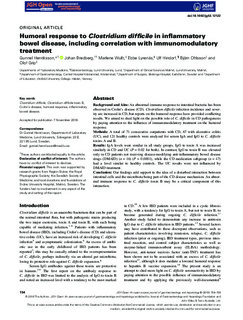Humoral response to Clostridium difficile in inflammatory bowel disease, including correlation with immunomodulatory treatment
Henriksson, Gunnel; Bredberg, Johan Per Ivar B; Wullt, Marlene; Lyrenäs, Ebbe; Hindorf, Ulf; Ohlsson, Björn; Grip, Olof
Journal article, Peer reviewed
Published version

View/
Date
2019Metadata
Show full item recordCollections
Original version
Journal of Gastroenterology and Hepatology Open (JGH Open). 2019, 3 (2), 154-158. 10.1002/jgh3.12122Abstract
Background and Aim: An abnormal immune response to intestinal bacteria has been observed in Crohn’s disease (CD). Clostridium difficile infection incidence and severity are increased in CD, but reports on the humoral response have provided conflicting results. We aimed to shed light on the possible role of C. difficile in CD pathogenesis by paying attention to the influence of immunomodulatory treatment on the humoral response.
Methods: A total of 71 consecutive outpatients with CD, 67 with ulcerative colitis (UC), and 121 healthy controls were analyzed for serum IgA and IgG to C. difficile toxins A and B.
Results: IgA levels were similar in all study groups. IgG to toxin A was increased similarly in CD and UC (P = 0.02 for both). In contrast, IgG to toxin B was elevated only in CD patients not receiving disease-modifying anti-inflammatory bowel disease drugs (DMAID) (n = 16) (P = 0.0001), while the CD medication subgroup (n = 47) had a level similar to healthy controls. The UC results were not influenced by DMAID treatment.
Conclusion: Our findings add support to the idea of a disturbed interaction between intestinal cells and the microbiota being part of the CD disease mechanism. An abnormal immune response to C. difficile toxin B may be a critical component of this interaction.
